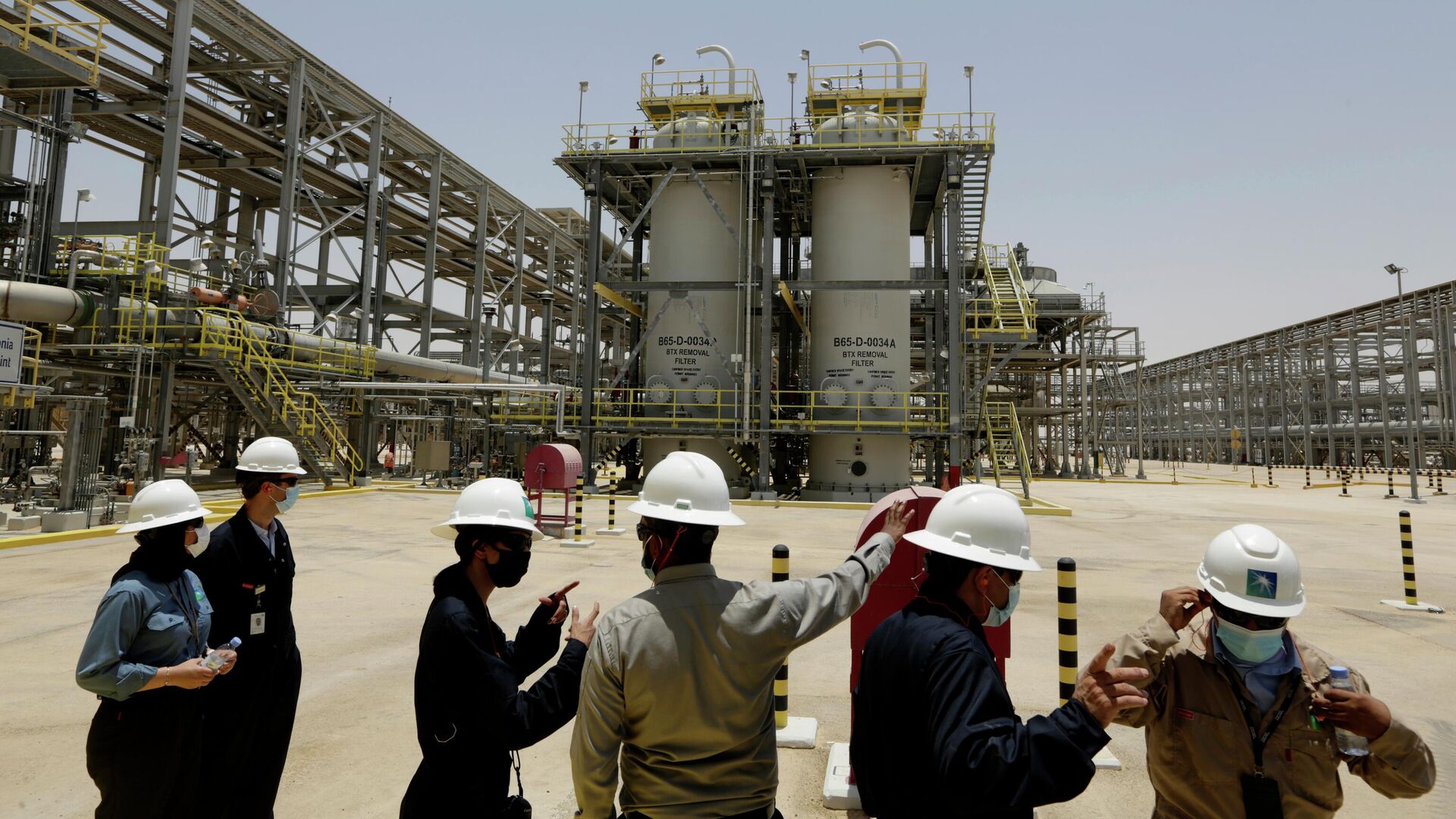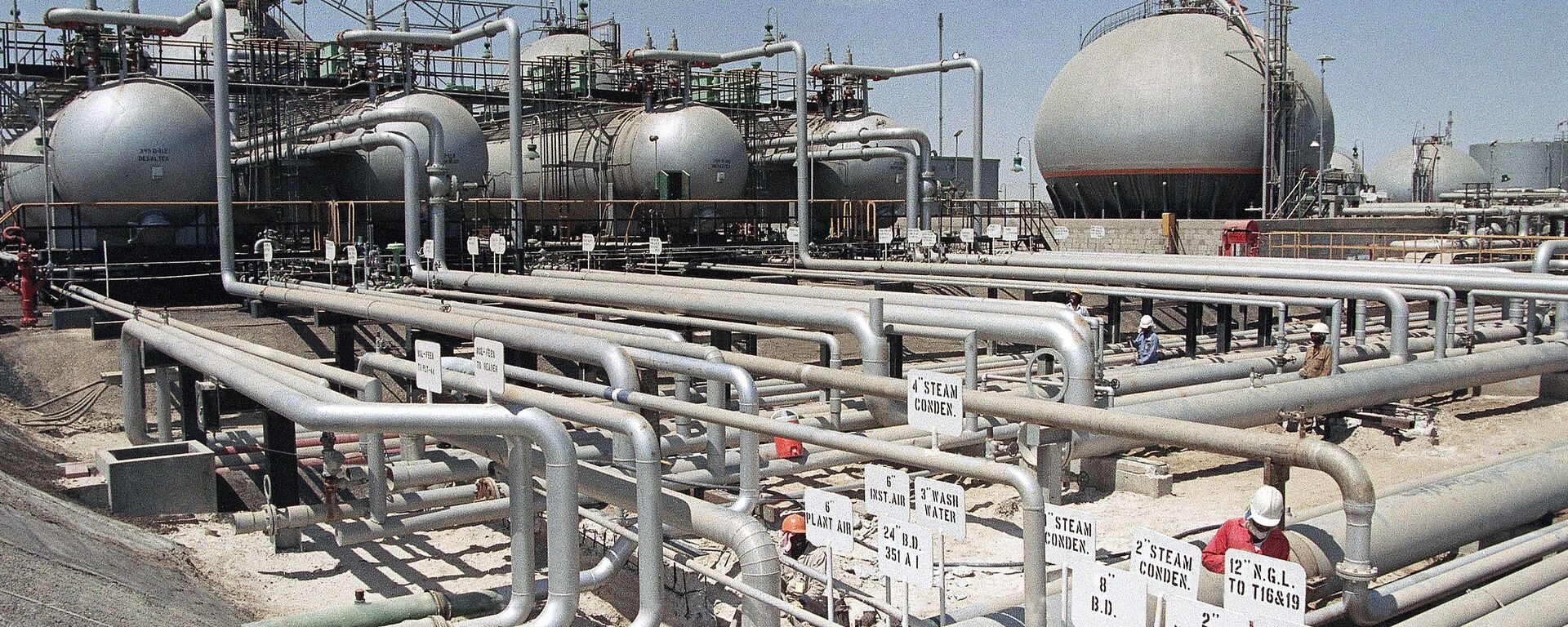https://sputnikglobe.com/20230811/chinas-demand-for-saudi-oil-primed-to-surge-despite-global-output-cuts-1112530970.html
China's Demand for Saudi Oil Primed to Surge Despite Global Output Cuts
China's Demand for Saudi Oil Primed to Surge Despite Global Output Cuts
Sputnik International
Saudi crude purchase about to grow in September compared to August, with Aramco supplying additional term cargoes to refiners such as China's Rongsheng Petrochemical and other customers in Asia.
2023-08-11T11:27+0000
2023-08-11T11:27+0000
2025-04-07T11:07+0000
economy
china
saudi arabia
south korea
saudi aramco
aramco
joe biden
russia
riyadh
viral news
https://cdn1.img.sputnikglobe.com/img/07e6/05/07/1095339398_0:320:3072:2048_1920x0_80_0_0_d6f476949d155d39d588d5ec014b4faa.jpg
China is prepped to accept the delivery of almost 40 percent extra crude oil from Saudi Arabia in the upcoming month as a large Chinese oil refinery commences intake of more oil under a recently negotiated deal.According to market insiders, refiners anticipate getting a higher volume of oil, roughly 52 million barrels, in September, an increase from the current 37 million barrels received this month. Companies receive allocated oil barrels from Saudi Aramco after they nominate their supply based on the monthly crude price.The rise in numbers aligns with the beginning of a fresh supply agreement for Rongsheng Petrochemical Co. This company recently engaged in a significant deal worth $3.4 billion with Aramco, which not only involved taking a stake in the company but also included an arrangement to sell crude oil to this Chinese refining company.Saudi Arabia has ensured that its Asian clients receive complete oil shipments, even as it continues to cut supply on a global scale.For September sales to Asia, state-owned Saudi Aramco increased the price of Arab Light crude by 30 cents, setting it at $3.50 per barrel above standard. Nevertheless, the market was caught off guard by the lower-than-expected increment.Industry consultant OilChem reveals that China's state-owned refineries are targeting a new processing rate record for this month. Traders added that operational efficiency is a vital factor that affected the boost in nominations.In September, Aramco fulfilled its volume commitments to refiners in South Korea, Taiwan, and Thailand. This suggests that the impact of Aramco's production cuts could be felt more in other places.A Saudi Arabia FirstRiyadh's current stance is built around its national interest, which has important implications for its policies within the nation and on the international scene. This applies to broadening its diplomatic ties beyond the United States, showing a shift away from a US-centric interest to intertwining Gulf and non-American interests.The move to decrease oil production serves as a strategic move for Russia amidst Western sanctions while also signifying a significant shift in Riyadh-Washington ties. This change sets the stage for prospective abiding partnerships involving Beijing, Moscow, and Riyadh.OPEC has clarified that creating these voluntary adjustments in oil production is a proactive step to guarantee oil market stability.Saudi Arabia acted based on uncertain global energy forecasts. The IEA’s Oil Market Report - April 2023 indicates that global oil demand is set to increase by the end of 2023 due to a resurgence in jet fuel usage and the uptick in orders from China to support its industrial output.Saudi Arabia needs to shore up its oil revenues to make Vision 2030 a reality. This plan is essential for diversifying the economy and creating jobs, and it requires a massive investment of $3.2 trillion.China-Gulf CooperationPresident Joe Biden’s foreign policy thrusts vis-a-vis Saudi Arabia have elicited a rethink within the kingdom’s leadership, as Riyadh-Washington relations take a hit despite overtures by the West. Therefore, bilateral partnerships between the Saudis and Iran, UAE, Algeria, and Egypt all diminish the US's position as the region’s significant investor.Consequently, China has invested a whopping $273 billion in the region, a substantial 46 percent of which went into the energy sector.
https://sputnikglobe.com/20230312/saudi-arabian-oil-giant-aramco-records-net-profit-of-over-161bln-in-2022-1108311177.html
https://sputnikglobe.com/20220321/saudi-arabia-appears-to-be-fed-up-with-americas-foreign-policy---heres-why-1094052725.html
china
saudi arabia
south korea
russia
Sputnik International
feedback@sputniknews.com
+74956456601
MIA „Rossiya Segodnya“
2023
Sputnik International
feedback@sputniknews.com
+74956456601
MIA „Rossiya Segodnya“
News
en_EN
Sputnik International
feedback@sputniknews.com
+74956456601
MIA „Rossiya Segodnya“
Sputnik International
feedback@sputniknews.com
+74956456601
MIA „Rossiya Segodnya“
china, saudi arabia, crude oil delivery, chinese oil refinery, saudi aramco, rongsheng petrochemical co, supply agreement, asian clients, arab light crude, oil price, operational efficiency, production cuts, south korea, taiwan, thailand, oil market, industry consultant, oil trade, global supply. vision 2030 saudi arabia, opec, joe biden, gulf economies, energy market volatility, oil production cuts, geopolitical shifts, china-gulf relations, riyadh-washington relations, ukraine war, global oil demand, china investments in the middle east.
china, saudi arabia, crude oil delivery, chinese oil refinery, saudi aramco, rongsheng petrochemical co, supply agreement, asian clients, arab light crude, oil price, operational efficiency, production cuts, south korea, taiwan, thailand, oil market, industry consultant, oil trade, global supply. vision 2030 saudi arabia, opec, joe biden, gulf economies, energy market volatility, oil production cuts, geopolitical shifts, china-gulf relations, riyadh-washington relations, ukraine war, global oil demand, china investments in the middle east.
China's Demand for Saudi Oil Primed to Surge Despite Global Output Cuts
11:27 GMT 11.08.2023 (Updated: 11:07 GMT 07.04.2025) Purchases of Saudi crude are about to grow in September compared to August, with Saudi Aramco supplying additional term cargoes to refiners such as China's Rongsheng Petrochemical and other customers in Asia.
China is prepped to accept the delivery of almost 40 percent extra crude oil from Saudi Arabia in the upcoming month as a large Chinese oil refinery commences intake of more oil under a recently negotiated deal.
According to market insiders, refiners anticipate getting a
higher volume of oil, roughly 52 million barrels, in September, an increase from the current 37 million barrels received this month. Companies receive allocated oil barrels from Saudi Aramco after they nominate their supply based on the monthly crude price.
The rise in numbers aligns with the beginning of a fresh supply agreement for Rongsheng Petrochemical Co. This company recently engaged in a significant deal worth $3.4 billion with Aramco, which not only involved taking a stake in the company but also included an arrangement to sell crude oil to this Chinese refining company.
Saudi Arabia has ensured that its Asian clients receive complete oil shipments, even as it continues to cut supply on a global scale.
For September sales to Asia, state-owned Saudi Aramco increased the price of Arab Light crude by 30 cents, setting it at $3.50 per barrel above standard. Nevertheless, the market was caught off guard by the lower-than-expected increment.
Industry consultant OilChem reveals that China's state-owned refineries are targeting a new processing rate record for this month. Traders added that operational efficiency is a vital factor that affected the boost in nominations.
In September, Aramco fulfilled its volume commitments to refiners in South Korea, Taiwan, and Thailand. This suggests that the impact of Aramco's production cuts could be felt more in other places.
Riyadh's current stance is built around its national interest, which has important implications for its policies within the nation and on the international scene. This applies to
broadening its diplomatic ties beyond the United States, showing a shift away from a US-centric interest to intertwining Gulf and non-American interests.
The move to decrease oil production serves as a strategic move for Russia amidst
Western sanctions while also signifying a significant shift in Riyadh-Washington ties. This change sets the stage for prospective abiding partnerships involving Beijing, Moscow, and Riyadh.
OPEC has clarified that creating these voluntary adjustments in oil production is a proactive step to guarantee oil market stability.
Saudi Arabia acted based on uncertain global energy forecasts. The
IEA’s Oil Market Report - April 2023 indicates that global oil demand is set to increase by the end of 2023 due to a resurgence in jet fuel usage and the uptick in orders from China to support its industrial output.
Saudi Arabia needs to shore up its oil revenues to make Vision 2030 a reality. This plan is essential for diversifying the economy and creating jobs, and it requires a massive investment of $3.2 trillion.
President Joe Biden’s foreign policy thrusts vis-a-vis Saudi Arabia have elicited a rethink within the kingdom’s leadership, as
Riyadh-Washington relations take a hit despite overtures by the West. Therefore, bilateral partnerships between the
Saudis and Iran, UAE,
Algeria, and
Egypt all diminish the US's position as the region’s significant investor.
Consequently, China has invested a whopping
$273 billion in the region, a substantial 46 percent of which went into the energy sector.




